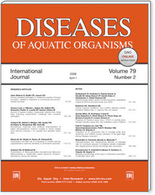
DISEASES OF AQUATIC ORGANISMS
Scope & Guideline
Advancing Knowledge in Aquatic Health
Introduction
Aims and Scopes
- Pathogen Characterization and Immunology:
Research on identifying and characterizing pathogens affecting aquatic organisms, including bacteria, viruses, fungi, and parasites. This includes studies on their virulence factors, modes of transmission, and interactions with the host immune system. - Aquaculture Health Management:
Focus on health management strategies in aquaculture, including disease prevention, biosecurity measures, and treatment protocols. This area also examines the impacts of farming practices on the health of cultured species. - Environmental Impact Studies:
Investigations into how environmental factors, such as climate change, pollution, and habitat degradation, influence the health and disease prevalence in aquatic organisms. - Epidemiology and Surveillance:
Research on the epidemiological trends of diseases in wild and farmed aquatic species, including the development of monitoring systems and cut-off values for disease detection. - Comparative Pathology:
Comparative studies that analyze disease processes across different species of aquatic organisms to identify common patterns and unique adaptations in disease response. - Molecular and Genetic Studies:
Utilization of molecular techniques, including qPCR and genomic sequencing, to study the genetic basis of disease susceptibility and resistance in aquatic organisms.
Trending and Emerging
- Climate Change and Disease Dynamics:
Research exploring the impact of climate change on the prevalence and distribution of aquatic diseases is increasingly prominent. This includes studies on temperature effects, habitat shifts, and pathogen adaptation to changing environments. - Molecular Epidemiology and Genomics:
There is a growing trend towards the use of molecular tools for epidemiological studies, including genomic analyses of pathogens and host organisms. This allows for a deeper understanding of disease transmission dynamics and genetic resistance. - One Health Approach in Aquatic Health:
An emerging focus on the One Health concept, which integrates human, animal, and environmental health perspectives. This includes studies that examine the interconnectedness of diseases in aquatic organisms and their implications for broader ecosystems. - Emerging Infectious Diseases and Pathogen Discovery:
Increased documentation of novel pathogens affecting aquatic species, particularly in the context of global trade and climate change. This includes research on previously unrecognized diseases in both wild and farmed populations. - Use of Advanced Diagnostic Techniques:
The adoption of innovative diagnostic methods, such as next-generation sequencing and advanced bioinformatics, is on the rise. These techniques enhance the ability to detect and characterize pathogens more effectively.
Declining or Waning
- Traditional Pathogen Detection Methods:
There has been a noticeable decline in studies focusing solely on traditional methods of pathogen detection, such as culture techniques. This shift is likely due to the rapid advancement and adoption of molecular techniques that provide faster and more accurate results. - Generalized Studies on Environmental Factors:
Research that broadly examines environmental factors without specific ties to disease outcomes has decreased. There is a move towards more targeted studies that connect environmental changes directly to specific disease dynamics. - Non-specific Host Response Studies:
There is a waning interest in research that describes generalized host responses to infections without a focus on specific pathogens or disease mechanisms. The trend is moving towards more detailed investigations of specific immune responses and their implications for disease management.
Similar Journals
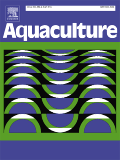
AQUACULTURE
Elevating knowledge in the realm of aquaculture.AQUACULTURE is a premier academic journal dedicated to the field of aquatic science, published by Elsevier. With a robust Impact Factor, the journal is renowned for its significant contributions to aquatic biology and the sustainable development of aquaculture practices. Since its inception in 1972, AQUACULTURE has established itself as an essential resource for researchers and professionals in the industry, regularly ranked in the Q1 category of aquatic science journals and positioned in the 14th percentile of its field according to Scopus rankings. Covering a wide array of topics including fish biology, aquaculture technology, sustainable practices, and environmental impacts, AQUACULTURE aims to disseminate innovative research findings that drive the industry forward. The journal, accessible to a global audience from its base in the Netherlands, continues to foster collaboration, discussion, and application of research to both academic and practical realms within aquaculture. Researchers and students alike will find valuable insights and current trends in this highly respected publication.

Fish and Shellfish Immunology Reports
Innovating insights into fish and shellfish health.Fish and Shellfish Immunology Reports is a distinguished journal published by ELSEVIER, focusing on the vital intersection of immunological responses in aquatic organisms. Established in 2021, it has quickly gained recognition for its contributions to the fields of Aquatic Science and Immunology, achieving a commendable Q2 ranking in Aquatic Science and a Q3 ranking in Immunology as of 2023. This journal is pivotal for researchers, professionals, and students, providing a platform for the dissemination of innovative research findings and critical reviews on fish and shellfish immunology. Based in the United Kingdom, Fish and Shellfish Immunology Reports remains committed to advancing scientific knowledge and collaboration in this niche yet significant area of study. The journal is indexed in Scopus, illustrating its academic credibility with rankings in both the Agricultural and Biological Sciences as well as the Immunology and Microbiology categories. Although currently not an open-access publication, it prides itself on maintaining high standards of peer review and ethical research practices.
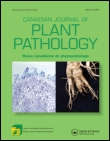
CANADIAN JOURNAL OF PLANT PATHOLOGY
Cultivating knowledge at the intersection of plant science and environmental health.Canadian Journal of Plant Pathology, published by Taylor & Francis Inc, is a leading academic journal dedicated to advancing the field of plant pathology, with a significant focus on the interplay between plant health and environmental factors. Established in 1979, this journal has established a reputation for high-quality research, currently holding a commendable impact factor within its category. As of 2023, it ranks in the Q2 quartile for both Agronomy and Crop Science as well as Plant Science, highlighting its importance and influence in these domains. With an impressive ranking of 142/516 in Plant Science and 115/406 in Agronomy and Crop Science according to Scopus, the journal is positioned within the 72nd and 71st percentiles, respectively. The Canadian Journal of Plant Pathology serves as a vital platform for researchers, professionals, and students aiming to contribute to the understanding of plant diseases, fostering innovation and development in agricultural practices.

Biosafety and Health
Fostering collaboration in biotechnology and microbiology.Biosafety and Health is a leading peer-reviewed journal published by ELSEVIER, dedicated to advancing knowledge and practice in the fields of biotechnology, infectious diseases, microbiology, and public health. With an ISSN of 2096-6962 and an E-ISSN of 2590-0536, this Open Access journal has been accessible to the global research community since 2019, fostering collaboration and innovation from its base in the Netherlands. Ranked Q2 in multiple categories according to the latest metrics, including Biotechnology and Microbiology (medical), it stands as a testament to high-quality, impactful research that influences clinical and environmental practices. The journal has achieved substantial recognition in various medical fields, ranking in the 88th percentile for Public Health, Environmental and Occupational Health, and the 78th percentile for Infectious Diseases. Researchers and practitioners seeking to contribute to this evolving domain are encouraged to submit their findings, as the journal aims to promote interdisciplinary dialogue and address pressing global health challenges.
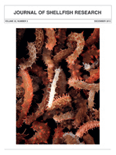
JOURNAL OF SHELLFISH RESEARCH
Connecting Researchers to Shellfish InsightsJOURNAL OF SHELLFISH RESEARCH is a prominent publication in the field of aquatic science, specifically focusing on the biology and ecology of shellfish. Published by the NATL SHELLFISHERIES ASSOC, this journal provides a vital platform for researchers and professionals to share their findings, contribute to the understanding of shellfish ecosystems, and advance practices in aquaculture and fisheries management. The journal's current ranking places it in the Q2 category in aquatic science, reflecting its importance and relevance in the academic community. With its extensive history from 1993 to 2024, the JOURNAL OF SHELLFISH RESEARCH plays a critical role in disseminating high-quality research to enhance the sustainability and conservation of shellfish populations. Although the journal is not open access, it attracts a wide readership eager to engage with groundbreaking studies and innovative methodologies, making it an indispensable resource for anyone invested in aquatic biology and the shellfishing industry.

OCEANOLOGICAL AND HYDROBIOLOGICAL STUDIES
Exploring the depths of oceanic knowledge.OCEANOLOGICAL AND HYDROBIOLOGICAL STUDIES, published by WALTER DE GRUYTER GMBH, serves as a crucial platform for the dissemination and discussion of pivotal research in the field of oceanography and hydrobiology. With an ISSN of 1730-413X and an E-ISSN of 1897-3191, this journal highlights interdisciplinary studies that address pressing ecological issues impacting marine environments. Although it currently ranks in the Q4 category of oceanography journals and holds a Scopus rank of 96 out of 145, its commitment to publishing high-quality research positions it as a valuable resource for researchers, professionals, and students alike. As it converges into 2024, OCEANOLOGICAL AND HYDROBIOLOGICAL STUDIES remains dedicated to advancing our understanding of aquatic systems, contributing significantly to the scientific community's efforts in ocean conservation and management.

Tropical Plant Pathology
Fostering dialogue for a sustainable agricultural future.Tropical Plant Pathology, published by Springer, is a leading journal in the fields of Agronomy and Crop Science as well as Plant Science, as evidenced by its impressive position in the Q2 quartile rankings for 2023. This esteemed journal, with an ISSN of 1983-2052, focuses on the intricacies of plant diseases and their management, showcasing significant research that addresses challenges faced by agronomists and plant scientists, particularly in tropical environments. With a Scopus ranking of 147th in Plant Science and 116th in Agronomy and Crop Science, it is recognized for its contribution to the advancement of knowledge in these areas, which is crucial for food security and sustainable agriculture. The journal operates under a model that facilitates researchers and professionals in disseminating their work effectively, fostering an ongoing dialogue among scholars dedicated to enhancing crop health and productivity. Discover more about groundbreaking studies in plant pathology that shape the future of agriculture!
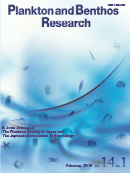
Plankton & Benthos Research
Championing the Study of Essential Aquatic OrganismsPlankton & Benthos Research, published by the Plankton Society of Japan, serves as a pivotal platform in the fields of Aquatic Science, Ecology, and Oceanography. With its inception in 2006 and ongoing publication until 2024, this esteemed journal focuses on the complex interactions within aquatic ecosystems, emphasizing the significance of plankton and benthic organisms in maintaining ecological balance. Although it is categorized in the Q3 quartile across several disciplines, it continues to provide valuable insights and a forum for researchers to share innovative findings and methodologies. The journal is not currently open access, which ensures a layer of curator-driven content quality. Its impact, measured through Scopus rankings, showcases its role in fostering knowledge exchange among academics and professionals engaged in ecological and environmental studies. With an ISSN of 1880-8247 and E-ISSN 1882-627X, Plankton & Benthos Research invites contributions that enhance our understanding of the aquatic realm, establishing itself as a crucial resource for ongoing research and advancement in these essential fields.

Inland Water Biology
Innovating Insights into Freshwater BiologyInland Water Biology is a distinguished peer-reviewed journal published by MAIK NAUKA/INTERPERIODICA/SPRINGER, focusing on the intricate interactions within freshwater ecosystems. With its ISSN (1995-0829) and E-ISSN (1995-0837), this journal has established itself as an essential resource for researchers and professionals in the fields of Aquatic Science and Ecology, evidenced by its consistent ranking in the Q3 category for both disciplines in 2023. Covering a wide array of topics related to the biology of inland waters, the journal aims to disseminate cutting-edge research findings and theoretical advancements that contribute to the understanding of aquatic environments and their ecological significance. Although it does not offer open access, its impact in the academic community is noteworthy, ensuring that published works undergo rigorous peer review. Researchers, professionals, and students alike will find valuable insights and innovative approaches within its pages, making Inland Water Biology a vital addition to their academic endeavors.
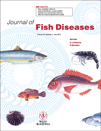
JOURNAL OF FISH DISEASES
Shaping the future of fish disease management and research.JOURNAL OF FISH DISEASES, published by WILEY, stands as a preeminent peer-reviewed journal in the fields of aquatic science and veterinary medicine. With its ISSN 0140-7775 and E-ISSN 1365-2761, this journal has been a leading platform for disseminating groundbreaking research since its inception in 1978. Recognized for its excellence, it boasts a Q1 ranking in both Aquatic Science and Veterinary (miscellaneous) categories for 2023, affirming its vital role in advancing knowledge in fish pathology and health management. The journal engages a diverse audience of researchers, professionals, and students committed to tackling fish diseases and enhancing aquaculture practices. Although it does not offer open access, the journal ensures high visibility and accessibility to key research findings that impact aquatic ecosystems and veterinary practices globally. With a commitment to fostering innovation, the JOURNAL OF FISH DISEASES continues to shape the future of aquatic health research well into its convergence through 2024.